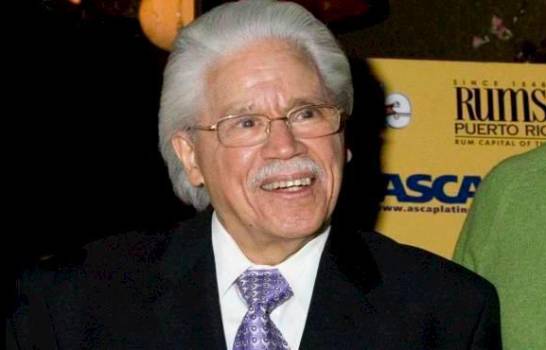The co-founder of “La Fania All-Star” was hospitalized with pneumonia
Legendary Dominican musician Johnny Pacheco died this Monday at the age of 85 after being hospitalized for pneumonia.
This Sunday, his wife, Cuqui Pacheco, asked for a prayer chain and requested privacy given the situation they are going through.
Salsa announcer Eugenio Pérez confirmed the news on his social networks.
His death occurred in a hospital in New York.
We have lost in these moments the greatest of the salsa representation: Our Johnny Pacheco passed away A tragedy for the world of music in general. RIP my dear father”, wrote the well-known “Senior Salsa specialist”.
Pacheco is credited with being the creator of the term “salsa” and was a co-founder of the mythical orchestra “La Fania All-Star” where great performers such as Celia Cruz, Rubén Blades, and Héctor Lavoe.
Juan Azarías Pacheco Kiniping, better known as Johnny Pacheco, was born Los Pepines de Santiago in 1935 and is considered the creator of the musical concept “salsa” that was given to rhythms born in the Spanish-speaking Caribbean, mainly from Cuba. The Dominican Republic and Puerto Rico.
“We are the teacher Johnny Pacheco, pioneer of the first Latin American musical movement of world significance, the one that through songs has managed to tell the living history of the neighborhood: salsa. To him, thanks for so much,” said Eugenio Pérez.
At the end of 1963, the clarinetist and musical director created the Fania Records label with Jerry Masucci. In 1964, the label released its first album: “Cañonazo”, an album that featured Pete “Conde” Rodríguez as the vocalist.
In 1968, Johnny Pacheco created the Fania All-Stars orchestra that included artists such as Larry Harlow, Willie Colón, Celia Cruz, Hector Lavoe, Ray Barretto among others. As a company executive, creative director, and music producer, Pacheco was charged with launching the careers of many young stars who were part of Fania Records.
In 2009, Pacheco was recognized by the Association of Art Chroniclers of the Dominican Republic -Acroarte- with the highest award of Premios Soberano.
He was considered one of the most influential figures in Latin music. Knowledgeable as few of the West Indian sounds, when he met another revolutionary in the music industry, like Jerry Masucci, they made a great duo to promote the music that today is known as salsa.
Since he was a child, he was fond of music. Son of Rafael Azarías Pacheco (who was a clarinetist), he received his first instrument as a gift. In 1946, 11-year-old Pacheco traveled to New York with his family, where he settled and fell in love with percussion when he entered the Juilliard Academy.
The first group he was part of was that of the pianist Charlie Palmieri, at the end of the 50s. In 1960 he decided to form his orchestra, Pacheco y Su Charanga, and his first album, titled as his ensemble, sold 100,000 copies, becoming a star not only in New York and the cities with Latino populations in the United States but in Asia, Europe and countries in Central and South America.
In 1963 he founded Fania Records with Masucci and one-year Cañonazo appeared, the label’s first album, with Pete ‘El Conde’ Rodríguez as a vocalist. The Fania All-Stars was born in 1968 and among the artists who passed through this group are Larry Harlow, Celia Cruz, Willie Colón, Héctor Lavoe, and Ray Barretto.
Without leaving music, Pacheco worked at the label as creative director and producer and was the architect of the launch of several salsa stars.
In its most important moments, Fania brought together some 200 renowned artists of tropical music with styles that transcended the limits of traditional Latin music to make their way to genres such as Latin big-band, Afro-Cuban jazz, jazz, boogaloo, and salsa.
In fact, Pacheco considered salsa a mixture of Caribbean rhythms such as guaracha, mambo, pachanga, guajira, güagüancó, and chachachá.
Another facet of him was that of a composer. He was the author of about 150 songs, such as Acuyuye and Quitate tú (Pa ’put me), which is among the most famous. Also, from My happiness, The king of punctuality, The number one hundred, and Celia and Tito.
He was also the author of soundtracks for films such as Our Latin Thing, Salsa, Mondo New York, and Something Wild.
Some time ago, diagnosed with Parkinson’s, he returned to the Dominican Republic, where he spent several years. Salsa, the genre that he helped forge, will always appreciate its sounds and the management it.
https://youtu.be/QrHDFrL2bzM

